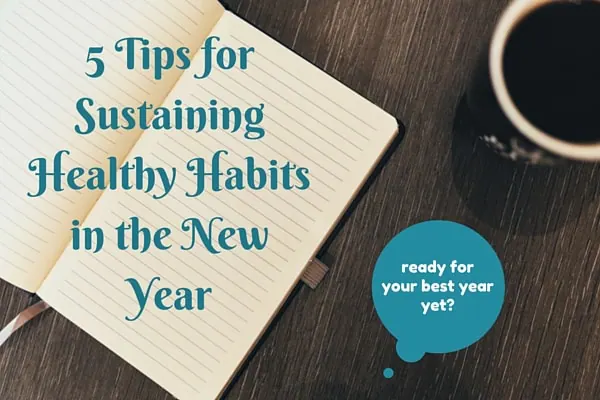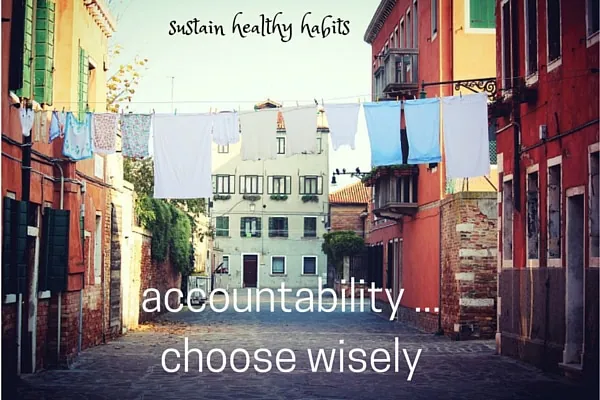
Setting goals and resolutions for healthy habits at the turn of the New Year is easy—sustaining healthy habits throughout the year is tough. The usual trouble spots are easy to identify. Clothes fit a little tighter; there’s less money in savings than we’d like, and any sense of satisfaction or fulfillment is fleeting.
That last one is harder to pinpoint; it’s not like the hard truth of spilling out of a pair of freshly washed jeans. Satisfaction and fulfillment are subtle and emotional.
Of course, if we’re honest, it’s all fueled by emotion.
Passion may offer a prompt, but focusing on the areas of life we want to see improvement, progress, or accomplishment requires a plan. Willpower alone is not enough. The same resolutions wouldn’t appear on the list year after year otherwise.
The good news is, it’s easy. The bad news is, it’s easy not to.
Thankfully, there are more resources to achieve personal goals than ever before in human history—easy to find, easy to access, easy to do, and most of it is free.
Easy to do? Yes. For most of us, we can do sit-ups, take a walk, prepare a healthy snack or pack a lunch, create a budget, read a book or save money rather than collecting more stuff, but then we don’t.
Old, self-sabotaging habits die hard because it’s automatic, familiar, and even comforting once a habit is formed. Habits (unhealthy or healthy) are something we rehearse, either for ourselves or a broader audience.
So how do we sustain healthy habits, so they become automatic and produce lasting change?

1. Know the Why
When we have a strong enough reason to follow through, sometimes, a positive reward is enough; other times, avoiding the negative gets us off the couch and on the treadmill. Figure out whichever it is, or use both, and you’ll have the key to unlocking the power of motivation.
An example of this in my own life was the goal of following a budget. This goal had been on the list for so long that it was like a pet.
In January, the whys were always good and emotionally charged but not enough to persevere past February. When I took a hard look at our budget last year, a reality lit a fire for change like never before—we could take a vacation with the money we were spending on things we didn’t even care about.
We let the convenience of not paying attention to the details rob us of the greater good.
How do I know this particular why produced motivation? We have followed a budget (the longest consistent stretch in our lives).
Three questions to find the Why:
- What will it produce?
- What will it cost me?
- Who will I become in the process?

2. Create a detailed, written plan
One of the life lessons I learned last year: a goal is not a plan. Talking about the goal, lamenting the need to reach the goal, and thinking about goals is not a plan. You must write it down. Unless you already have lots of margin (the room between your load and your limits), you’ll have to sacrifice something else to fit a new purpose on the schedule.
Our calendar, plate, budget, and checkbook reveal our priorities. If you can’t find the time to write it down or put it on a calendar, then let it go and recognize it’s probably something you think you should do rather than something you desire.
Writing a cookbook had been a goal for many years too, but last year I created a detailed plan for every aspect of what it would take to make it happen—improving photography skills, chapter outline, writing, software, research, and recipe testing.
This required several days to lay out on a calendar, but it worked. Ten months later, I held what was once a dream in my hands, Serve and Savor was in print.
Your written plan should include:
- A definition of success. Your goal for exercise may be consistency (at least 3 x every week) rather than weight loss. Growing your business may mean increasing customer retention instead of sales numbers. Identifying your target will help you know when you’ve hit it.
- Clearly defined, ordered steps. Numbering the steps or defining a length of time for each will focus all of your energy on one thing at a time. If eating healthier is #1, practice meal planning and cooking for a month before you begin working out. If it takes more than a month to get a handle on a healthy diet, that’s okay; give it your total focus and get into a rhythm before adding exercise (or vice versa). Trying to do too much all at once can become overwhelming and discouraging, so we give up on it. No matter what, do number one before moving on to the next step. Build on success.
- Routine check-ups. Keep in mind that a plan is a guide and must be adjusted. Whether the budget gets blown up by a trip to the ER or someone schedules a weekly meeting during your workout time, your plan will need to be tweaked. Schedule weekly and monthly checkpoints to count victories and refine the plan for continued progress.

3. Eliminate pitfalls (excuses)
Just like identifying our motivations (knowing the why), it is equally vital to identify stumbling blocks. Magazines, TV, convenience foods, long or complicated workouts, special equipment, debt, an over-committed schedule, social media, video games, or the inability to say “no” can be a pitfall to achieving something meaningful.
I adore Rice Crispy treats. Extra butter, please. Oh, and Oatmeal Cookies with pecans and dates … Ugh, it’s true. This is also why none of them are allowed in the house (though they might show up on my birthday or Christmas).
It’s because I can’t trust my willpower, so I stay completely away from the things that trip me up when it comes to healthy food choices. I know how hard it is not to grab something convenient (and lacking nutrition) when I work through lunch or the schedule gets tight, so planning healthy snacks is a must.
Would you like to guess our biggest household budget buster? Yep, groceries. This is easy to justify as a food blogger, but I had to reign it in. I had to change my whatever-looks-good habit to following a shopping list—if it’s not on the list, it stays at the store (even if it’s on sale).
This was a hard habit to change because it was easy to justify buying more items with “I’m already here” or “it’s cheaper this way” type thinking. I wouldn’t change the habit of spending too much and wrecking my grocery budget if I didn’t ditch picking up impulse on-sale items. Even good things can distract, so we have to clear the path.
Your goals are at stake, maybe more, so eliminate what holds you back.

4. Accountability is crucial (choose wisely)
Support groups, Bible studies, business contacts, good friends, and neighbors can all be part of the boost we often need to press through. If you’re serious about reading more books, join a book club.
Are you trying to fit in more exercise and activity to lose weight? There’s probably someone you know who would like to exercise more and needs the same accountability you do to take a walk instead of veg on the couch.
When we determined to follow a written budget, a good friend did the same, which helped me immensely. She and I traded texts, emails, and phone calls about negative behaviors we were trying to redirect. We didn’t have to share specific numbers to encourage each other, and it was reassuring to know I had someone to call when I was discouraged or simply tired of trying.
Don’t be afraid to ask for help.
As crucial as accountability is, choose groups and partners wisely. It requires a certain level of vulnerability, so you want to find someone who shares your goals and wants to help you win.
A private Facebook group can serve as a virtual round table to share ideas and encouragement, conveniently bridging distance and saving time. Trust me; whatever area of life you’re trying to improve, you’re not alone.

5. Stay inspired
It would help if you had positive input in your life. We benefit from that. Now is the time to follow healthy food blogs or talk to personal trainers, business, or financial coaches promoting the changes you’re trying to make. If you already know someone successful in a particular area, take them to lunch and listen to their story.
One of the things that continued to inspire me during our “stick to the budget” journey was listening to Dave Ramsey on iHeart Talk Radio. Hearing the real-life accounts (both warnings and successes) of people trying to change their financial future was the added boost I needed to persevere.
When it’s hard, and we’re tired, and the old ruts are easy to fall back into, we need to be reminded it is possible!
There is no magic pill and no quick fix. Sustaining healthy habits will take knowing the why, creating a written plan, eliminating pitfalls, fostering accountability, and staying inspired. Listen to a podcast, attend a workshop, sign-up for a class—don’t give up!
“All right everyone, fresh start! We’re gonna have a good day, which will turn into a good week, which will turn into a good year, which will turn into a good life!” — Joy (from the movie, Inside Out)
ChgoJohn says
A thought-provoking post, Judy. Just this past week, I’ve started looking more seriously into what direction to take in a few years. I’m sure that there are some changes coming my way and planning now will make whatever transition(s) I make that much more easier. Getting things in writing is an important part of the process. Thanks for sharing your thoughts.
mjskit says
Clearly a post written from personal experience. 🙂 Great post Judy! Lots of good ideas and easy ones to follow if you set your mind to it. Over the holidays I did a lot of soul searching because it is possible that by September, I will be forced to fully retire as the grant I’m working part-time on might not be renewed. So at 62, what do I do next? So for whatever I decide, your ideas will help to make it happen. Thanks!
Raymund says
Nice tips! For me I would play sports more, with more people involved the more successful your healthy regime will be (at least for me), plus I am interacting with more people and be more social.
John/Kitchen Riffs says
Awesome post! Truly excellent — wonderful content, and so well written. Goals are easy, plans aren’t — so simple, but so hard to learn. Thanks for this. And Happy New Year!
Judy Purcell says
Aw, thanks John, for your kind feedback and encouragement. Happy New Year to you and Mrs. Kitchen Riffs. 🙂